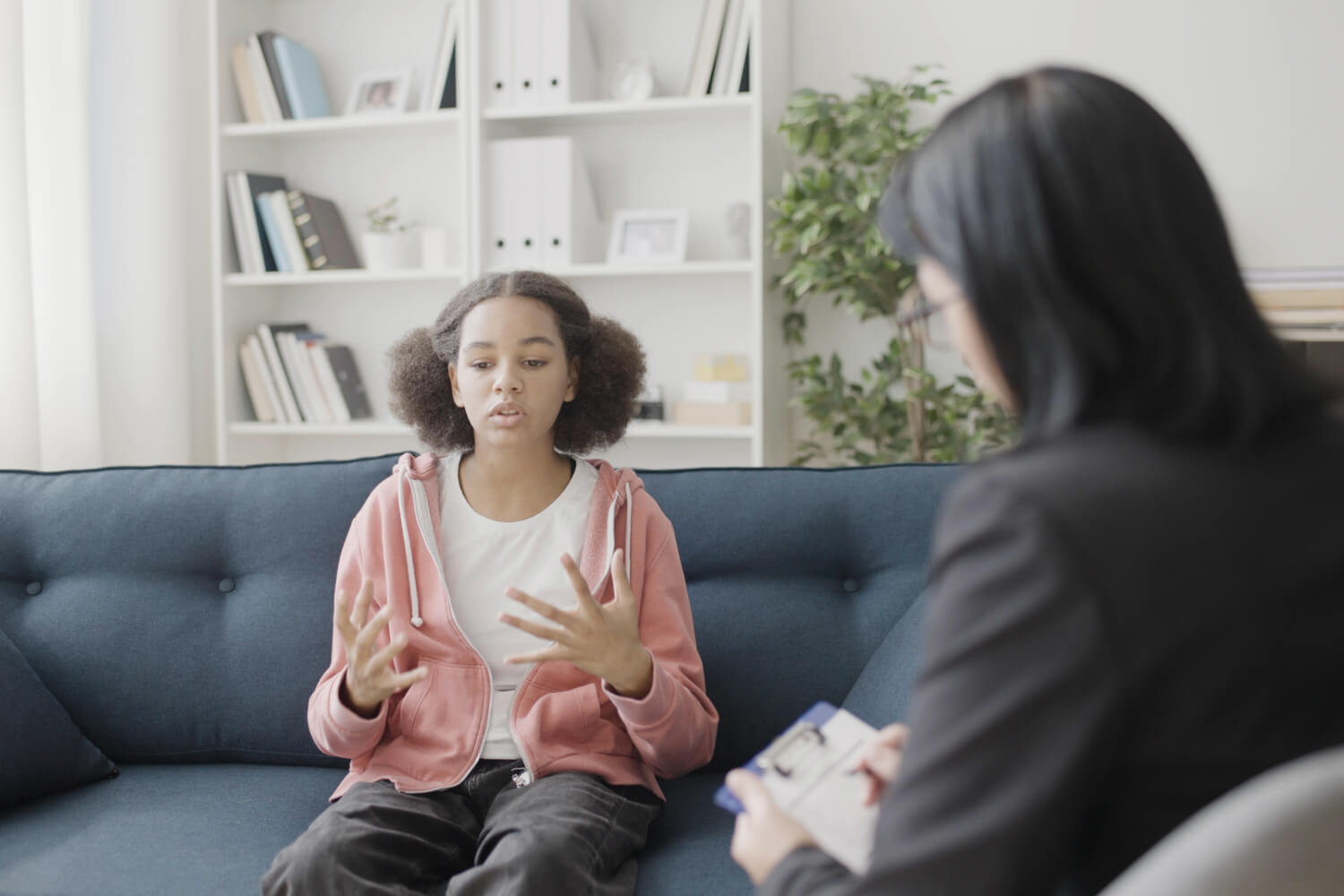The Role of a Specialist for Teens: Kinds Of Therapy and Their Influence On Youth Mental Wellness
The function of a specialist for teens is crucial in attending to the intricacies of adolescent psychological wellness. Different restorative approaches, such as Cognitive-Behavioral Therapy and Art Therapy, offer tailored support to meet private requirements. Therapists For Teens. These methods not just help in managing anxiousness and clinical depression yet additionally promote psychological expression. Recognizing these therapies and their impacts discloses crucial understandings into exactly how young individuals navigate their mental wellness trips, raising questions about their effectiveness and availability
Comprehending Teen Mental Health Challenges
As teens browse the complexities of maturing, they usually run into numerous psychological wellness challenges that can substantially influence their development. Usual issues consist of identification, clinical depression, and anxiety dilemmas, which can emerge due to scholastic pressures, social characteristics, and domestic assumptions. Throughout this duration of substantial adjustment, teenagers may battle to reveal their feelings, bring about confusion and seclusion.
The stress to comply with peer standards can exacerbate feelings of insufficiency, while social media sites may magnify contrasts and insecurity. In addition, hormonal adjustments contribute to psychological volatility, complicating their capacity to handle stress.
Comprehending these obstacles is essential for parents, educators, and psychological health and wellness experts. Youth Counselling Near Me. Recognition cultivates an atmosphere where teens feel verified and supported, allowing them to look for help when required. By recognizing and addressing these mental health concerns early, intervention approaches can be applied to promote strength and total health throughout this important developmental stage

Exploring Different Kinds Of Treatment for Teenagers
While teens deal with a myriad of psychological health difficulties, various restorative strategies can effectively resolve their distinct demands. One extensively utilized technique is Person-Centered Treatment, which highlights empathy and genuine positive regard, enabling teens to discover their feelings in a safe environment. In A Similar Way, Dialectical Behavior Modification (DBT) focuses on teaching emotional policy and interpersonal skills, making it specifically useful for those with extreme emotions.
One more effective strategy is Art Treatment, which uses imaginative expression to assist teenagers interact feelings that might be difficult to verbalize vocally. Team Treatment likewise offers an encouraging setting where teens can share experiences, promoting a sense of reducing and belonging isolation. Finally, Family members Therapy engages member of the family in the therapeutic procedure, resolving relational dynamics that might add to a teen's psychological health concerns. These diverse therapeutic techniques offer necessary support and can lead to significant renovations in teenage mental health.
The Advantages of Cognitive-Behavioral Therapy
Cognitive-Behavioral Treatment (CBT) stands out amongst the different healing methods offered for teenagers, using a structured structure for resolving mental health difficulties. Youth Counsellor. This evidence-based treatment concentrates on recognizing and changing adverse thought patterns and behaviors, advertising healthier coping approaches. One significant benefit of CBT is its capacity to equip adolescents by furnishing them with functional devices to handle anxiety, depression, and other emotional problems
Moreover, CBT is frequently goal-oriented and time-limited, which can be especially attracting teenagers and their family members looking for concrete results. By promoting self-awareness, teens discover to acknowledge triggers and develop analytical abilities. In addition, CBT encourages open communication between the specialist and the teenage, promoting an encouraging atmosphere for talking about personal issues. The skills gotten throughout CBT sessions can result in lasting improvements, helping teenagers browse life's difficulties better, eventually improving their total mental health.
The Imaginative Expression of Art Therapy
Art therapy offers a special outlet for teens to explore and express their feelings artistically, enabling them to look what i found connect feelings that may be challenging to articulate verbally. This therapeutic technique motivates self-discovery and personal reflection with various creative tools, such as painting, attracting, or sculpting. By participating in creative activities, adolescents can face and refine their feelings in a secure atmosphere, permitting them to get understanding right into their internal experiences.
The non-verbal nature of art therapy can be specifically useful for those that have a hard time with typical talk therapies. As teenagers develop art, they may uncover underlying problems and establish coping methods to manage their obstacles. Furthermore, art treatment promotes a sense of achievement and enhances self-confidence, as individuals can share themselves in an unique means. Inevitably, this form of therapy not only improves emotional expression but additionally advertises psychological health and wellness and wellness amongst teenagers.
Building Strength With Helpful Therapeutic Relationships

With regular involvement, therapists can aid teens determine their strengths and weaknesses, advertising self-awareness and individual development. This encouraging vibrant not only improves psychological well-being however likewise imparts a sense of belonging, which is vital during the tumultuous teenage years.

Furthermore, the restorative connection acts as a model for healthy and balanced interpersonal links, instructing adolescents how to interact successfully and develop limits. Inevitably, a strong healing alliance lays the structure for strength, allowing teenagers to browse life's hardships with better confidence and adaptability.
Frequently Asked Inquiries
Just How Can Parents Support Their Teenagers During Treatment Procedure?
Parents can sustain their teens during treatment by proactively paying attention, encouraging open interaction, appreciating confidentiality, and revealing compassion. They should also inform themselves about the restorative process and endure their teenager's emotional journey.

What Indications Indicate a Teen May Demand Treatment?
Indications indicating a teenager may need therapy consist of consistent unhappiness, withdrawal from tasks and pals, drastic modifications in behavior, scholastic decrease, boosted irritability, compound use, problem focusing, and revealing sensations of pessimism or unimportance.
For How Long Does Therapy Usually Last for Teens?
Therapy for teens generally lasts from a few weeks to a number of months, relying on the person's goals and requirements. Sessions typically take place weekly, with progression reviewed frequently to establish the appropriate period and frequency.
Are Online Treatment Procedure Effective for Teenagers?
Research study suggests that online therapy sessions can be efficient for teens, supplying ease of access and ease. However, end results rely on individual preferences, the quality of the healing relationship, and the particular systems utilized for sessions.
How Can Teens Choose the Right Therapist on their own?
Teenagers can select the best therapist by taking into consideration compatibility, read here experience in adolescent concerns, and therapeutic technique. They must really feel comfy reviewing issues, and it's valuable to look for suggestions from relied on grownups or peers.
Various restorative methods, such as Cognitive-Behavioral Therapy and Art Treatment, offer customized assistance to satisfy individual demands. Another effective method is Art Treatment, which makes use of creative expression to help teens communicate feelings that may be hard to verbalize vocally. Cognitive-Behavioral Therapy (CBT) stands out among the various healing strategies available for teenagers, supplying an organized framework for resolving mental wellness obstacles. Art treatment offers a special electrical outlet for teens to check out and reveal their emotions creatively, allowing them to communicate sensations that may be challenging to articulate vocally. The non-verbal nature of art treatment can be especially useful for those who struggle with typical talk therapies.